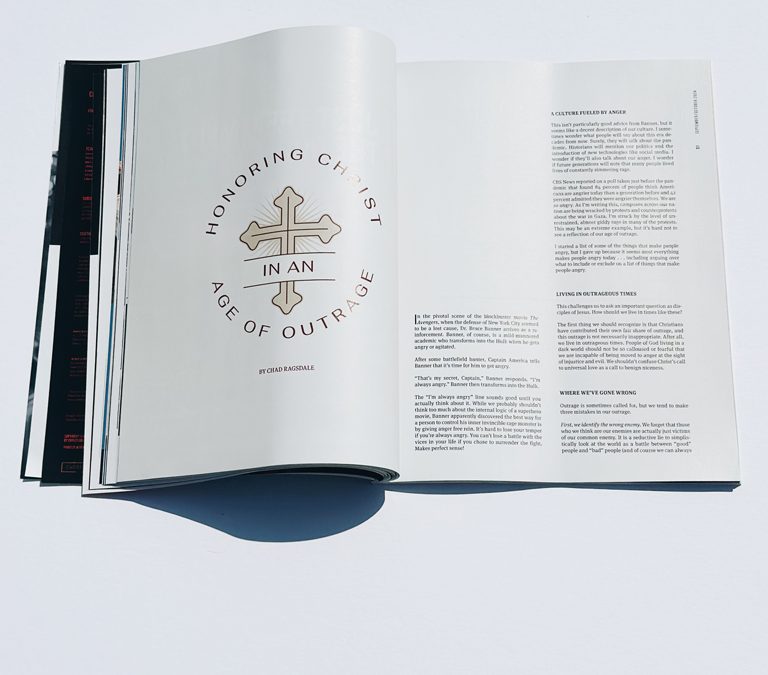By Jerry Harris
I was recently asked to give a 20-minute talk describing the Restoration Movement to a group of about 400 people. As I prepared my remarks, I considered a variety of things I could highlight, many of which were historical. I wanted my presentation to be engaging and compelling, but upon completing my preparations, I wasn’t satisfied I had hit the mark.
That same weekend, a friend who had ministered to a very large church came to our church as a guest speaker. I picked him up at his hotel and showed him around our area in the hours leading up to that night’s sermon. I decided to show him The Crossing’s campus in Hannibal, Missouri. I am particularly proud of that one because we purchased and transformed a theater in the downtown area. The building was built for vaudeville in the roaring twenties, and we restored it to its former glory.
The location also has great personal significance for me as it is where I started my journey that led me to become publisher of Christian Standard, but that’s another story . . . one which I’ve written about before.
My friend’s church is nondenominational but his roots are in the Assemblies of God. We became friends when he was invited to fellowship with a group of large-church ministers from across the country who gather regularly. When we stepped out of the church’s doorway onto the street, we were facing Central Park, the oldest green space in Hannibal’s downtown. I told him that Barton W. Stone started the first church at the park in a log cabin that also served as a school. I pointed in the direction of the Mississippi River, four blocks away, and indicated that Stone died at his daughter’s house “right over there.” Then I pointed up to Cardiff Hill in the distance and told him that Stone’s wife, Celia, “is buried up there.”
I thought he would be impressed with those facts, but the blank stare on his face indicated I had lost him.
“Do you know who Barton Stone is?” I asked. He did not.
I asked him if he had heard of the Cane Ridge Revival and the Second Great Awakening. He answered that he had.
I said that Cane Ridge was Barton Stone’s church . . . but then I decided to go a bit deeper.
“You fellowship with all these guys that are Restoration Movement. Would you like to know what we believe and why?” He answered that he would really appreciate that.
I told my friend that our movement is based on Jesus’ prayer recorded in John 17. It’s known as the “High Priestly Prayer,” and Jesus prayed it just before he and his disciples left the upper room and headed for the Garden of Gethsemane, where Jesus was arrested. In that prayer, Jesus focused on three things, and it’s on those three foundation stones that the Restoration Movement stands.
“Sanctify them by the truth; your word is truth” (John 17:17).
I told my friend that the first foundation stone of our movement is TRUTH . . . the belief and implementation of the truth of God’s Word. We don’t just believe the Bible contains truth, but that it is truth in its totality. This means we seek to use God’s Word as our only rule of faith and practice . . . that we do Bible things in Bible ways and call them by Bible names . . . that we speak where the Bible speaks and are silent where it is silent . . . no creed but Christ, no book but the Bible, no name but the Divine.
“[T]hat all of them may be one, Father, just as you are in me and I am in you” (John 17:21). “I in them and you in me—so that they may be brought to complete unity” (John 17:23).
I told him the second foundation stone of our movement is UNITY . . . to strive and fight for unity instead of giving in to our more fleshly needs of ego and pride. These foundation stones of truth and unity are held in tension with one another because truth without unity is sectarianism, clearly not what Jesus was praying for, and unity without truth is universalism, in complete contradiction to Jesus’ teaching in John 14:6.
Thomas Campbell said, “The church of Jesus Christ on earth is essentially, intentionally, and constitutionally one.” Barton Stone said, “Let Christian unity be our polar star.” While it might be easier to burn a bridge, we seek to build and maintain them but without sacrificing the truth.
“May they also be in us so that the world may believe that you have sent me” (John 17:21). “Then the world will know that you sent me and have loved them even as you have loved me” (John 17:23).
I told him the third foundation stone of our movement is EVANGELISM. Jesus’ prayer informs us that the whole mission of the church—Jesus’ declaration of building the church in Matthew 16:18 and his Great Commission in Matthew 28:18-20—is all dependent on his disciples living out the reality of truth and unity simultaneously. When a watching world sees that, they are drawn into the reality of a holy God, the sin that separates us from him, the sacrifice of a Savior who demonstrated his unconditional love for us on the cross, and the power that resurrects us from death even as Jesus was resurrected from the dead.
I looked at him and said, “You believe in all of those things too, don’t you? As a matter of fact, you believe in them just as much as I do.” He agreed.
My friend said he thought it was baptism by immersion that set our movement apart, and that we believed that unless you were baptized, you weren’t saved.
I took him back to that first foundation stone and pointed out that every conversion story recorded in the New Testament was accompanied by baptism by immersion. We do that because that is what we read in God’s Word.
He then brought up the fact that we take Communion weekly.
I responded that although Communion was shared initially in homes at meals and that Jesus had taught, “as often as you do it . . .”, that the final word in the New Testament was in Acts 20:7. It’s simply that we are trying our best to honor Jesus’ High Priestly Prayer by being obedient to what we read in his Word.
It’s painfully obvious that we can read and study God’s Word and come to different conclusions in biblical interpretation because there’s a lot that is downhill from these three foundation stones. But if we are all going to the same source, then even though we might disagree, we will do so in an agreeable way. When we do so, we do a much better job of honoring our Great High Priest’s prayer, and we are not putting a stumbling block in front of a lost and dying world.
I drove back from Hannibal with my friend not so much proud of myself for the conversation we had, but for the answer God gave me for the talk I was going to give a few days later. I discarded much of what I had prepared to discuss, and instead, recounted this conversation.
The best history we have isn’t about the Restoration Movement, it’s about the restoration of the world through the gospel of Jesus Christ. When we as a movement are in alignment with Jesus, we’re always in the right place!
While it’s relatively easy to find fault with a particular viewpoint, interpretation, or practice in the church, it’s another thing to stand against the prayer of our Lord and Savior. It reminds us that the church is his, not ours, and that we shouldn’t be giving orders . . . especially when we seem to have a problem taking them.






0 Comments